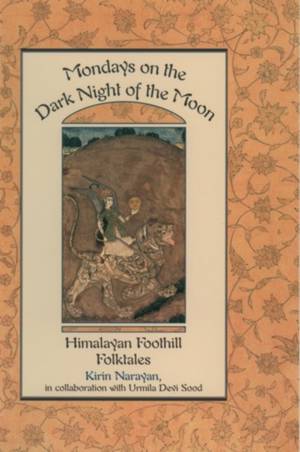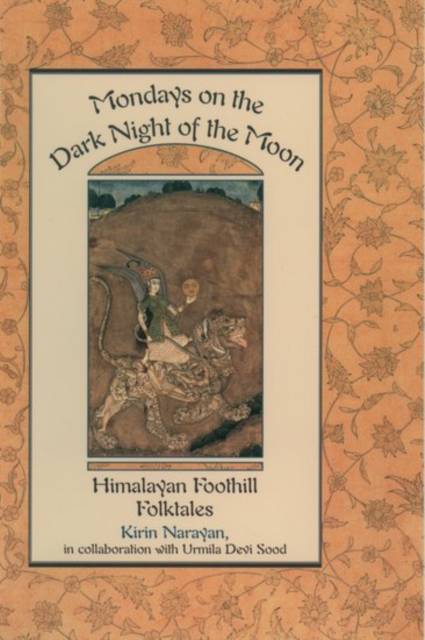
- Afhalen na 1 uur in een winkel met voorraad
- Gratis thuislevering in België vanaf € 30
- Ruim aanbod met 7 miljoen producten
- Afhalen na 1 uur in een winkel met voorraad
- Gratis thuislevering in België vanaf € 30
- Ruim aanbod met 7 miljoen producten
Zoeken
€ 59,45
+ 118 punten
Uitvoering
Omschrijving
Oral tales establish relationships between storytellers and their listeners. Yet most printed collections of folktales contain only stories, stripped of the human contexts in which they are told. If storytellers are mentioned at all, they are rarely consulted about what meanings they see in their tales. In this innovative book, Indian-American anthropologist Kirin Narayan reproduces twenty-one folktales narrated in a mountain dialect by a middle-aged Indian village woman, Urmila Devi Sood, or "Urmilaji." The tales are set within the larger story of Kirin Narayan's research in the Himalayan foothill region of Kangra, and of her growing friendship with Urmilaji Sood. In turn, Urmilaji Sood supplements her tales with interpretations of the wisdom that she discerns in their plots. At a moment when the mass-media is flooding through rural India, Urmilaji Sood asserts the value of her tales which have been told and retold across generations. As she says, "Television can't teach you these things."
These tales serve as both moral instruction and as beguiling entertainment. The first set of tales, focussing on women's domestic rituals, lays out guidelines for female devotion and virtue. Here are tales of a pious washerwoman who brings the dead to life, a female weevil observing fasts for a better rebirth, a barren woman who adopts a frog and lights ritual oil lamps, and a queen who remains with her husband through twelve arduous years of affliction. The women performing these rituals and listening to the accompanying stories are thought to bring good fortune to their marriages, and long life to their relatives. The second set of tales, associated with passing the time around the fire through long winter nights, are magical adventure tales. Urmilaji Sood tells of a matchmaker who marries a princess off to a lion, God splitting a boy claimed by two families into two selves, a prince's journey to the land of the demons, and a girl transformed into a bird by her stepmother.
In an increasingly interconnected world, anthropologists' authority to depict and theorize about distant people's lives is under fire. Kirin Narayan seeks solutions to this crisis in anthropology by locating the exchange of knowledge in a respectful, affectionate collaboration. Through the medium of oral narratives, Urmilaji Sood describes her own life and lives around her, and through the medium of ethnography Kirin Narayan shows how broader conclusions emerge from specific, spirited interactions. Set evocatively amid the changing seasons in a Himalayan foothill village, this pathbreaking book draws a moving portrait of an accomplished woman storyteller. Mondays on the Dark Night of the Moon offers a window into the joys and sorrows of women's changing lives in rural India, and reveals the significance of oral storytelling in nurturing human ties.
These tales serve as both moral instruction and as beguiling entertainment. The first set of tales, focussing on women's domestic rituals, lays out guidelines for female devotion and virtue. Here are tales of a pious washerwoman who brings the dead to life, a female weevil observing fasts for a better rebirth, a barren woman who adopts a frog and lights ritual oil lamps, and a queen who remains with her husband through twelve arduous years of affliction. The women performing these rituals and listening to the accompanying stories are thought to bring good fortune to their marriages, and long life to their relatives. The second set of tales, associated with passing the time around the fire through long winter nights, are magical adventure tales. Urmilaji Sood tells of a matchmaker who marries a princess off to a lion, God splitting a boy claimed by two families into two selves, a prince's journey to the land of the demons, and a girl transformed into a bird by her stepmother.
In an increasingly interconnected world, anthropologists' authority to depict and theorize about distant people's lives is under fire. Kirin Narayan seeks solutions to this crisis in anthropology by locating the exchange of knowledge in a respectful, affectionate collaboration. Through the medium of oral narratives, Urmilaji Sood describes her own life and lives around her, and through the medium of ethnography Kirin Narayan shows how broader conclusions emerge from specific, spirited interactions. Set evocatively amid the changing seasons in a Himalayan foothill village, this pathbreaking book draws a moving portrait of an accomplished woman storyteller. Mondays on the Dark Night of the Moon offers a window into the joys and sorrows of women's changing lives in rural India, and reveals the significance of oral storytelling in nurturing human ties.
Specificaties
Betrokkenen
- Auteur(s):
- Uitgeverij:
Inhoud
- Aantal bladzijden:
- 288
- Taal:
- Engels
- Reeks:
Eigenschappen
- Productcode (EAN):
- 9780195103496
- Verschijningsdatum:
- 19/06/1997
- Uitvoering:
- Paperback
- Formaat:
- Trade paperback (VS)
- Afmetingen:
- 158 mm x 233 mm
- Gewicht:
- 399 g

Alleen bij Standaard Boekhandel
+ 118 punten op je klantenkaart van Standaard Boekhandel
Beoordelingen
We publiceren alleen reviews die voldoen aan de voorwaarden voor reviews. Bekijk onze voorwaarden voor reviews.











